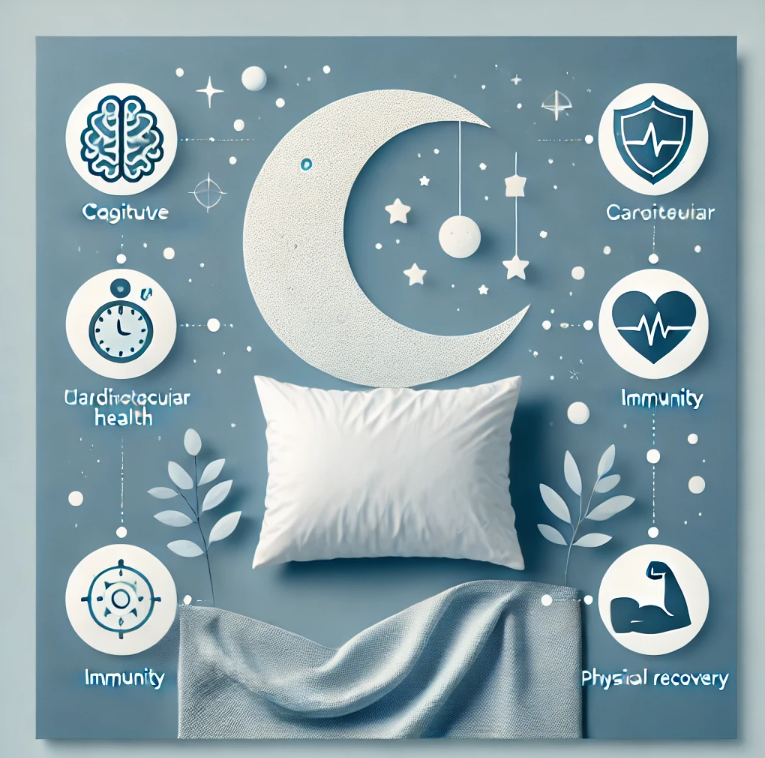Sleep is often considered a luxury in today’s fast-paced world, but it is, in fact, a fundamental pillar of health and well-being. Quality sleep affects every aspect of our lives, from our physical health to our mental clarity and emotional stability. In this blog, we will explore 10 reasons why sleep is important, its effects on different age groups, and provide a comprehensive understanding of its significance. By the end, you’ll also find answers to some frequently asked questions about sleep and its benefits.
1. Enhances Memory and Cognitive Function
During sleep, your brain processes and consolidates memories, enhancing learning and cognitive abilities. Whether you’re a student or a professional, sleep is essential for problem-solving, critical thinking, and creativity. This is particularly why sleep is important for students who need to retain large amounts of information and perform well academically.
2. Boosts Physical Health
Sleep plays a critical role in healing and repairing the body. It reduces the risk of chronic diseases like heart disease, diabetes, and high blood pressure. Adequate rest strengthens the immune system, enabling the body to fight off illnesses more effectively. Studies show that the 15 benefits of a good night sleep include improved heart health, faster recovery from injury, and reduced inflammation.
3. Regulates Mood and Emotional Stability
Sleep deprivation is directly linked to mood disorders, including anxiety and depression. A well-rested mind is better equipped to handle stress, solve problems, and maintain emotional balance. This underscores the importance of rest and sleep for emotional resilience and overall mental health.
4. Supports Growth and Development
For children and adolescents, sleep is vital for growth and development. Hormones responsible for growth are released during deep sleep, making it particularly important for younger individuals. This is one of the 10 reasons why sleep is important for kids, as it supports not only physical growth but also mental and emotional development.
5. Enhances Athletic Performance
Athletes often emphasize sleep because it aids in muscle recovery, energy restoration, and performance optimization. A lack of sleep can lead to slower reaction times, decreased endurance, and poor coordination, all of which are detrimental to physical activities.
6. Promotes Weight Management
Sleep affects hormones like ghrelin and leptin, which regulate hunger and satiety. Poor sleep can lead to overeating, weight gain, and metabolic disturbances. Incorporating proper rest into your routine is as vital as a balanced diet and regular exercise for maintaining a healthy weight.
7. Improves Concentration and Productivity
Sleep enhances focus, attention, and decision-making capabilities. For students, this means better academic performance; for professionals, it ensures increased productivity and efficiency. Sleep is a key contributor to effective time management and achieving goals, demonstrating why sleep is important for students and professionals alike.
8. Maintains Healthy Relationships
Poor sleep can lead to irritability, miscommunication, and conflicts in relationships. On the other hand, good sleep enhances patience, empathy, and overall interpersonal skills, making it easier to maintain healthy and fulfilling connections with others.
9. Protects Mental Health
Sleep deprivation can cause significant mental health issues, including memory loss and cognitive decline. It is essential for maintaining a sharp mind and preventing conditions like dementia and Alzheimer’s disease.
| Sleep Quality | Impact on Mental Health |
|---|---|
| Poor | Increased stress, anxiety |
| Moderate | Occasional forgetfulness |
| Optimal | Enhanced mental clarity |
10. Aligns with Natural Circadian Rhythms
Your body’s internal clock, or circadian rhythm, is designed to follow the natural cycle of day and night. Sleeping at night aligns with this rhythm and promotes better quality sleep. This explains why is it important to sleep at night than day, as daytime sleep can disrupt this natural process and lead to various health issues.

The Disadvantages of Sleep Deprivation
While we’ve discussed the benefits, it’s equally important to highlight the disadvantages of sleep deprivation:
- Increased risk of chronic diseases
- Weakened immune system
- Poor concentration and productivity
- Emotional instability
- Weight gain
Understanding these downsides further underscores the importance of sleep in our daily lives.
FAQs
1. What are the 15 benefits of a good night sleep?
- Enhanced memory, better immune function, improved mood, weight regulation, lower stress levels, reduced inflammation, better heart health, clearer skin, faster healing, higher energy levels, improved focus, increased creativity, emotional stability, better relationships, and greater overall well-being.
2. Why is it important to sleep at night than day?
- Nighttime sleep aligns with your circadian rhythm, leading to deeper and more restorative rest compared to daytime naps.
3. Why sleep is important for students?
- Sleep improves memory, concentration, and problem-solving skills, which are crucial for academic success.
4. What is the importance of rest and sleep?
- Rest and sleep are vital for physical recovery, mental clarity, and emotional stability, ensuring overall health and productivity.
5. Are there any disadvantages of sleep?
- Oversleeping can lead to fatigue, weight gain, and other health problems, but it’s generally the lack of sleep that poses more significant risks.


